What is good content (but really)?
With the rise of AI-generated content, with more useless SEO articles, and with Google's attempt to promote good content, the importance of quality became an important topic. But what is good content and how to create it?

Searches for "good content" are steadily increasing over time according to Google Trends. This can be looked at as a healthy trend of the creator economy or as a symptom of a suboptimal state of publishing online.
There are more content creators than ever before. They are on more platforms, and creators shoot more videos, post more photos, and publish more articles that can be comprehended.
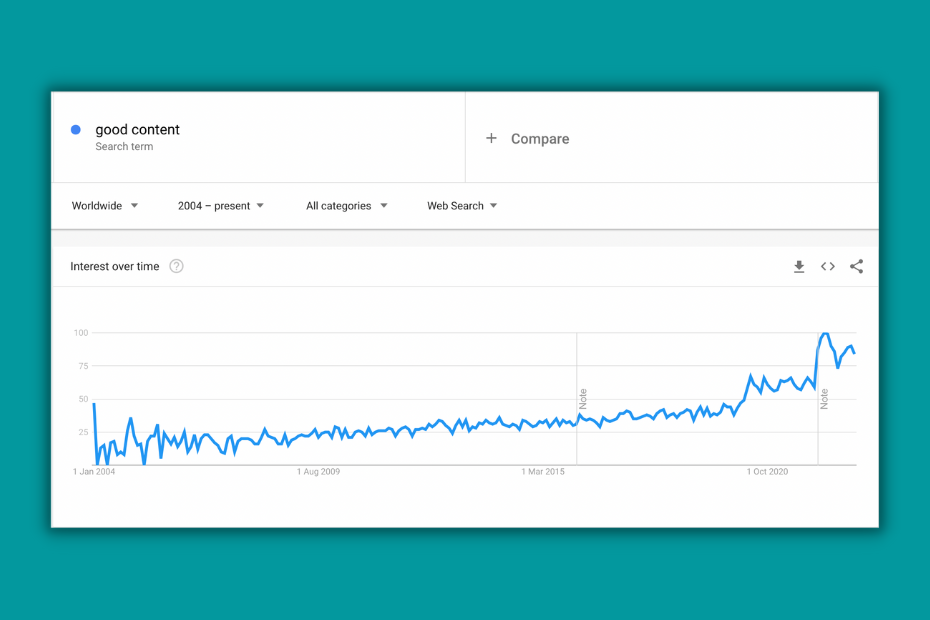
Just on YouTube 330,000 hours of video are uploaded every minute.
But not every creator is searching for how to create "good content".
In the meantime the presence of over-optimized articles and online junk available even as the top search result in Google is outstanding.
Searchers are moving away from Google to more "real" platforms like Reddit or Tiktok where instead of overly optimized articles written by ghostwriters they get real opinions and more enjoyable experiences.
But Google started to tackle the problem.
To fight "semi-fake reviews" (where the writer never touched the reviewed product) in search they released several product review updates, and to bridge the gap between searchers' expectation of good content and the sad reality, Google created the Helpful Content System.
The latter updates partially are meant to eliminate over-optimized content which is bad for the user.
Or as the Guys at Google put it:
"Google Search's helpful content system generates a signal used by our automated ranking systems to better ensure people see original, helpful content written by people, for people, in search results."
So the users got back in the driver's seat (at least on paper) when it comes to who determines what good content is.
Previously we could read several articles about "articles written for people, optimized for the algorithm". But it looks like this concept doesn't cut it anymore in Google Search.
Good content should be written for people and optimized to give them a satisfying experience.
"The helpful content system aims to better reward content where visitors feel they've had a satisfying experience, while content that doesn't meet a visitor's expectations won't perform as well."
The above section is from Google's guide on Creating helpful, reliable, people-first content.
The guide has several questions to consider when creating helpful content, though it is tricky how they tweaked the algorithm to truly reward good content.

If your goal is to create good content and attract visitors with SEO to your content then Google's linked guideline can come in handy.
But "good content" is not defined by Google.
Good content is determined by your audience.
The readers of your newsletter, the viewers of your Youtube channel, the lazy mob scrolling through your Tiktok.
What is good content for the visitor?
In Why you shouldn't write an SEO-driven blog I wrote about why relying on SEO metrics only leads to bad content. But I did not really offer my take on what I consider "good content".
This is my opinionated definition.
When it comes to determining what good content is, I go back to why I consume content in general.
I have three purposes for reading / watching / listening to content online:
- Learn something
- Get inspired
- Be entertained
First of all, I even want to be better informed to make a good decision or gather others' knowledge to help me solve a concrete problem (best note taking software, how to fix columns in excel).
Often I don't have a goal in mind when scrolling. I just want to get content creators' perspectives on different topics and their take on books, movies, and tools (how a random guy runs a marathon in 30 days, productivity setup tours).
I also watch funny cat videos.
I am not proud of it but maybe I spend the most time watching cat videos than any other type of "good content".
So when I put on my creator hat, I don't want to limit myself to one type of content. Good content is not always teaching something.
It often has a different end goal.
What is good content for the creator?
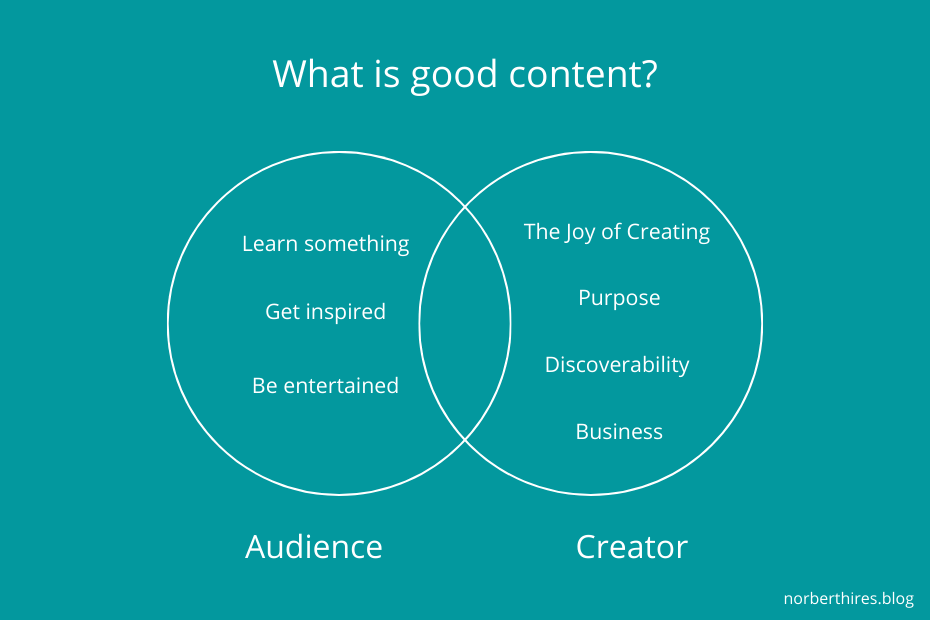
The definition of good content can make a different turn when we switch from consuming to creating.
While writing a good quality article that is read by a lot of people and its read time is above five minutes can be considered "good content", it can be a useless piece of content if the article doesn't accomplish the goals the creator indented it for.
There are different considerations when I determine whether a topic is a good fit for me to cover:
The Joy of Creating
In the long run, I want to create content I enjoy creating.
Not every article needs to be a topic I am overly excited about, but if there is too many "chore-like" idea in the pipeline, then I start to think about why I am doing this at all.
My purpose in writing is to help my younger self. I often pick topics to cover my failures and summarize my learnings.
Even if the article doesn't meet any other hard KPI, I still feel good about it.
Discoverable Content
I would love to create content for eternity just for the joy of creating it, but in reality, feedback and community are important to me.
I abandoned projects in the long run where I could not put my perceived good content in front of others.
Creating discoverable content is often platform-specific and you need to play by the rules of the platform, and satisfy its definition of good content.
You don't put 3rd party links to your LinkedIn posts, you optimize your thumbnails on Youtube, and you create Twitter threads because it's a proven formula on that platform.
Discoverability is an opportunity, but it should never come at the expense of good content perceived by the audience.
Engaging Content
Where the definition of good content by the creator meets the perception of good content by the visitor.
It is not enough to enjoy the process of creating and getting in front of people, your content has to be good.
Good for the Business
If you are creating content for the sake of it then you can be happy with a well-written article of your which managed to reach people.
But if you have more than a hobby then the next question is:
Is this content good for the business?
Does the content bring subscribers, signups, or leads?
Do you monetize eyeballs through ads?
Was your content successful at maximizing views then?
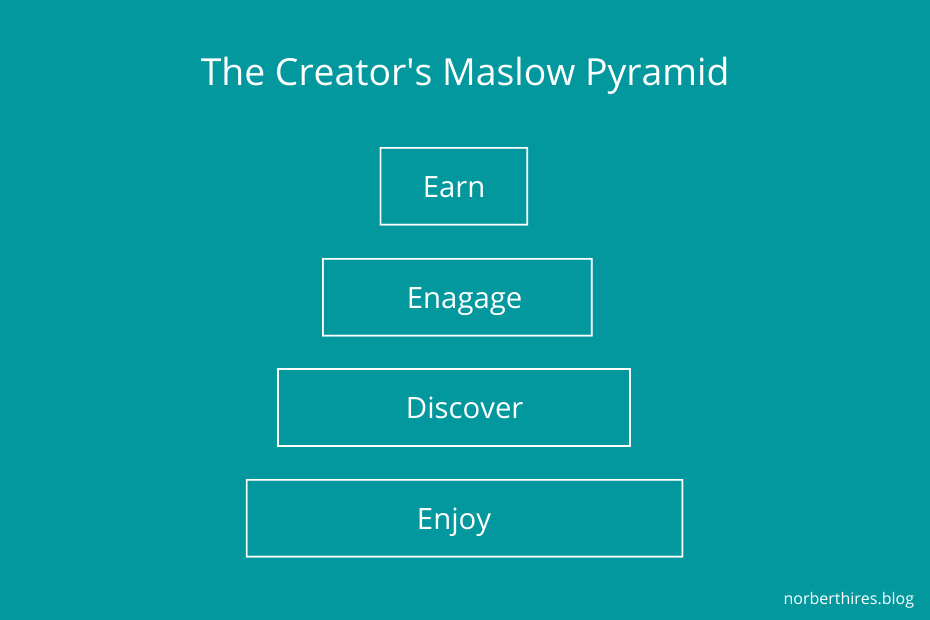
The definition of good content by the creator is often dependent on the goals of the creator.
If you are satisfied with enjoying the process and don't have other expectations then you can stop creating something with joy. Or any other step of the ladder.
Integral components of good content
We covered how good content is perceived according to the audience and creators. Let's check what are the components of creating good content and how to do it by yourself.
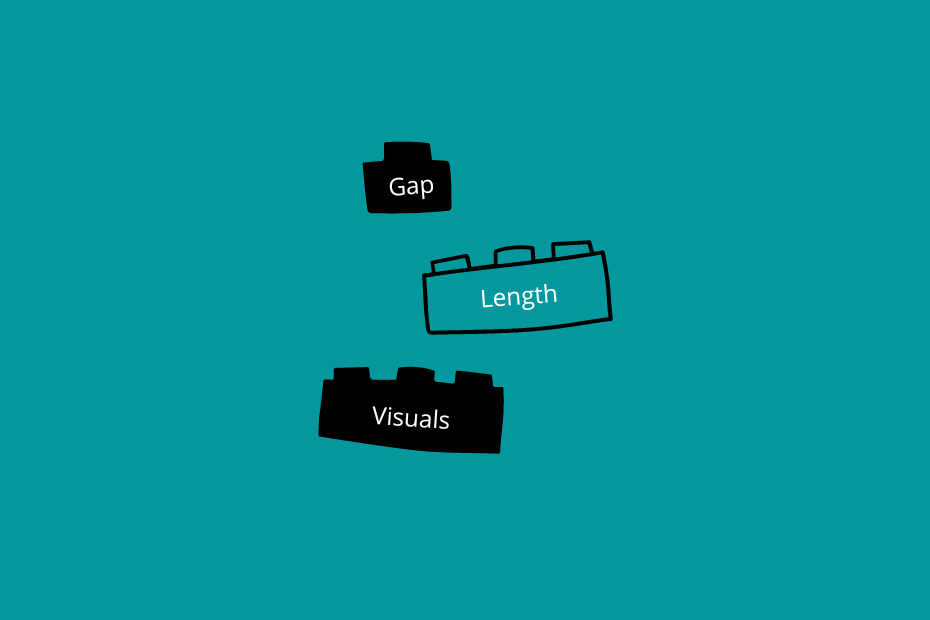
Does your content fill a gap?
Or put it frankly:
Does the world need your content?
There is no shortage of new content in the world.
Millions of videos, articles, and posts are published every minute. If we count quality resources published in the past, then there is a big likelihood that someone already covered the topic you intend to do.
You could argue that you are "competing only with yourself".
But don't be silly.
Most content is earning attention through online platforms. Take a social media site or search engine, but you are competing for eyeballs with other creators constantly.
What makes your content stand out?
Experience
Do you have any unique experience which is relevant to your topic?
If you want to cover "training for a marathon as a beginner", then try ChatGPT, it gives you a pretty good training plan and advice on what to eat and what to look out for during the race.
What AI can not do is share personal perspectives.
Get into the shoes of a beginner runner and talk about the unexpected challenges, emotional breaking points, and personal growth experienced during the journey.
Skills
Do you have any unfair advantage in terms of skills when it comes to your topic?
I used to read a lot of articles about SEO from SEO Professionals.
There is barely any unique article I find interesting today. We covered the main topics 100 times and revisiting the same concepts does not interest me.
But when a developer is writing about how to optimize website performance, or when a designer is covering usability for SEO then a basic topic becomes much more interesting.
Different angle
Do you have a different take on the topic which wasn't delivered before?
There is no shortage of articles when it comes to Core Web Vitals. Google even made its own guide on what / how / when to do.
But until everyone was pushing CWW and urging readers to work on them I doubted its importance.
My point of view wasn't present, so even though there was a lot of content about the topic, there wasn't any similar to mine.
It made sense to write this:
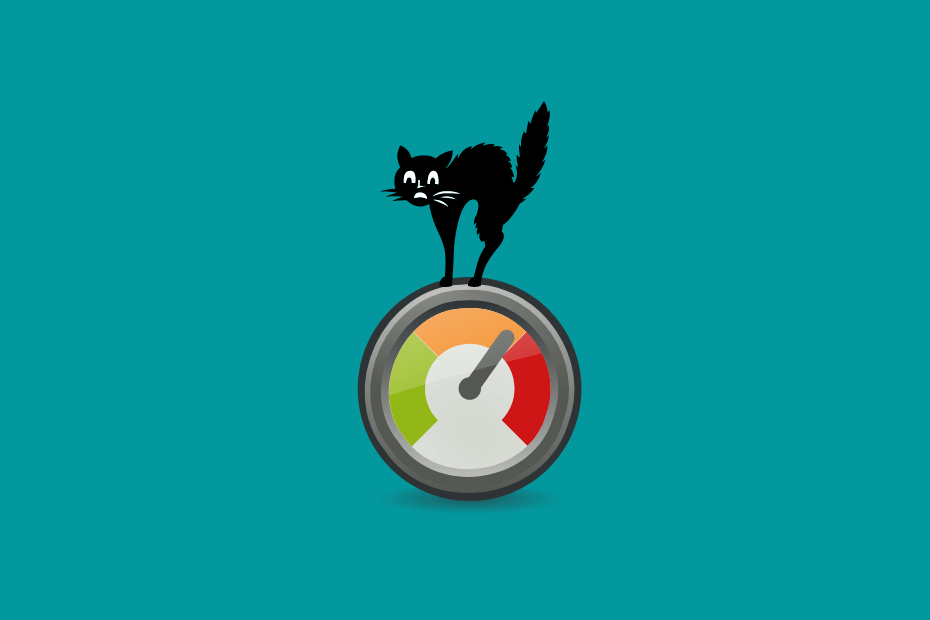
How long is a good article?
Searching for "lasagne recipe" and finding an article starting with the writer's childhood memories with lasagne is far from a good experience.
Articles became too lengthy often without enough content in them.
It's like the fast food of the internet.
Too many calories, not enough nutrients.
Writing for the algorithm and covering topics extensively for the sake of ranking in Google became harmful to the quality of the articles.
How long is a good article?
The right question is how short is a good article.
"Get rid of half the words on each page, then get rid of half of what’s left."
Writes Steve Krug, the author of the popular usability book, Don't Make Me Think.
“A designer knows he has achieved perfection not when there is nothing left to add, but when there is nothing left to take away.”
Add his insights the French aviator, turned book author, Antoine de Saint-Exupéry.
Be as precise as you can.
Remove unnecessary parts.
Respect your audience's time.
Share your story but start with the point when you catch the sight of the bear, not when you woke up that morning.
Is good content visual?
If you don't put visuals into your articles you have no chance in the online game. Even if you put images then you are still missing out. You should put a video. Or better: Put video shorts. Or virtual reality avatars and NFTs.
Nonsense.
We are still reading good content regardless of visuals.
I read Paul Graham's blog because I find his insights interesting. He publishes only plain text. His blog collapses on mobile. I still read it.
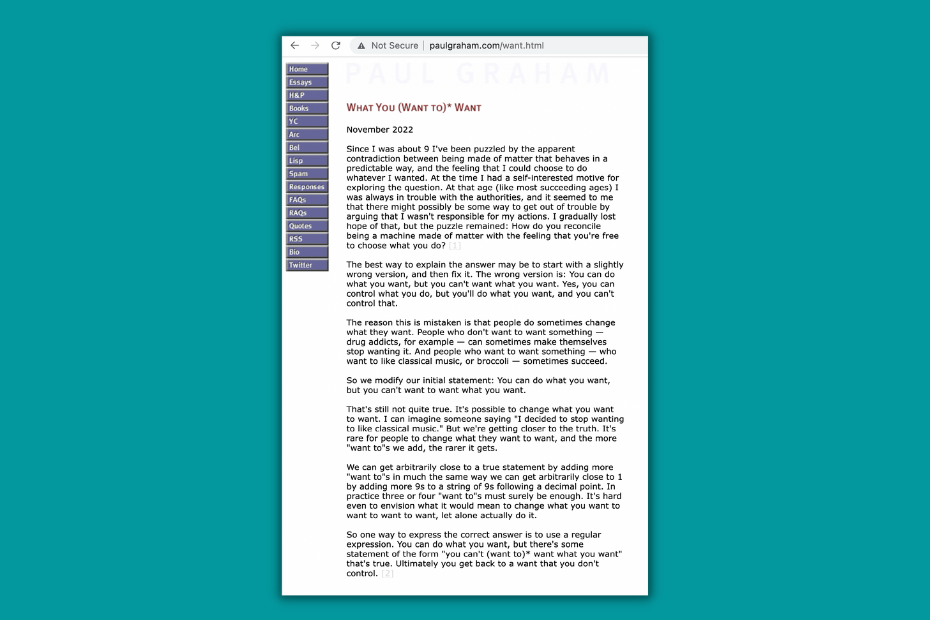
The question is not whether you should or should not include visuals to create good content. Plain text can be of great quality if the ideas contained in the articles are worthy.
Though we have to acknowledge the changes in how we consume content.
Our attention span is shorter.
35 seconds shorts are getting more popular, and most of us don't even watch a 10 minutes Youtube video, let alone read a 4000 words wall of text.
Visuals can be a tool to help you explain concepts better, make your article more readable and it can help you to reach audiences that you would never be able to attract with text only.
A well-written essay is still good content, just it is a match for fewer people.
Honest and enticing title
There is a long spectrum between click-bait and boring titles.
If you create something you believe has value for your audience then package it in a way to signal that perceived value.
You should be descriptive with your title.
Try to include what your content is about in a way that grabs attention without signaling anything which the potential visitor can not expect.
I want to read good content, but if you don't nudge me because "the cover" (title, thumbnails, intro) of your product is lazy, then I don't even give you a chance.
Give yourself a chance by creating honest and enticing titles.
Use numbers in your title if you can (single-digit numbers works best).
Shoot for titles around 11 words / 65 characters.
They don't get truncated in Google and they are long enough to include your value proposition in them.
Wrapping up
As I mentioned earlier this is my opinion and may be different from your definition of good content. Though I hope it provided some valuable nuggets on what is worth considering when creating content online.




